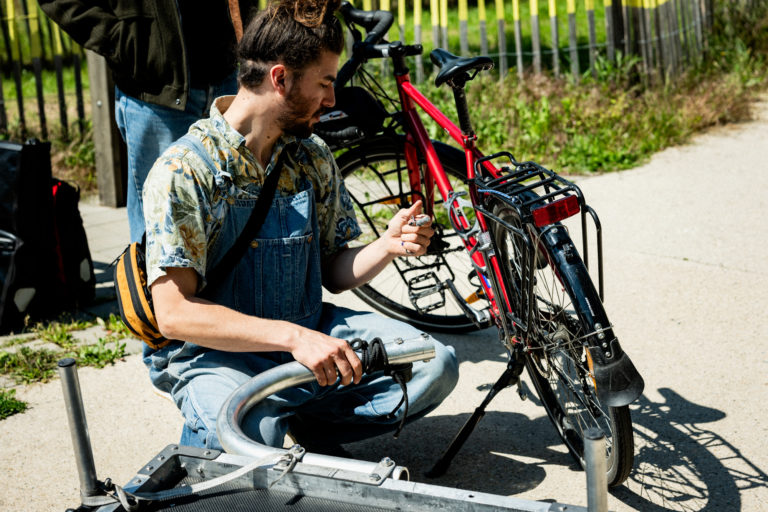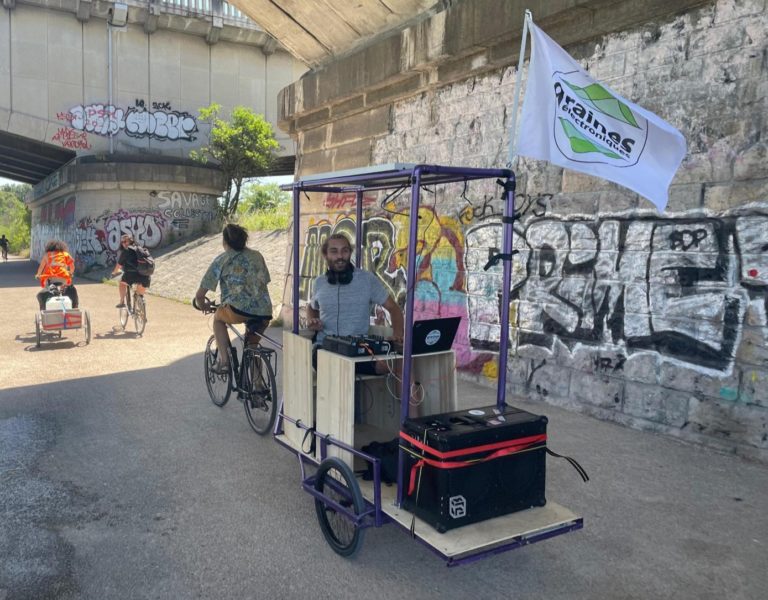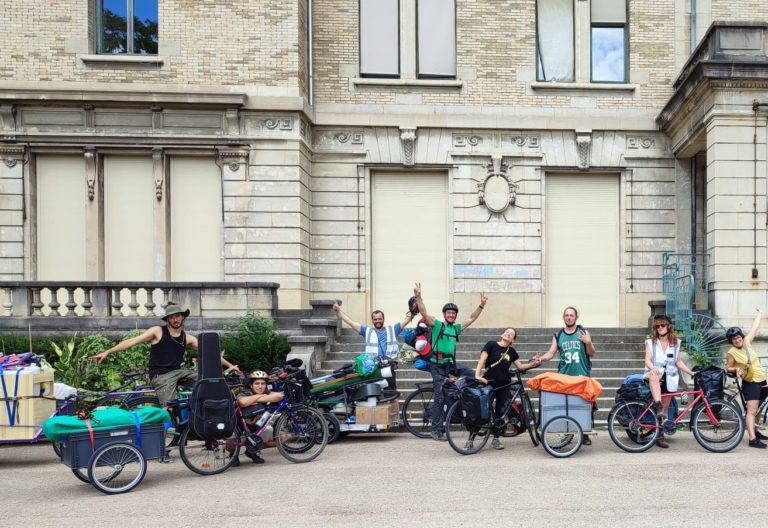Author: Baptiste Thomasset
Spurred on by the growing awareness that transport accounts for the vast majority of an event's environmental footprint, Graines Électroniques in Lyon is one of a number of organisations across Europe that are literally getting on their bikes to make cycling a festival staple. Cycle paths, cyclo-logistics, bike parades... This independent association is tackling the obstacles by experimenting and inventing tomorrow's festivals around cycling.

Graines électroniques' workshop in Lyon during Nuits sonores Lab, May 8th, 2024 – © Tony Noel
Wednesday 8 May 2024, 11am. In Lyon, the debate is in full swing in a small meeting room at the tip of the Confluence district between the Rhône and Saône rivers. What about an external battery? Too heavy, but very useful if using an app to plan your route. How many litres of water do you need? Not that much, you can fill your bottle at any cemetery you pass. Will a paper map do the trick? How do we transport the tent?
Despite a few puffy eyes on the morning after the opening night of the Nuits sonores festival, a dozen or so participants are gathered around Oriane Pontet and Lindsy Reynold, co-founders of the independent association Graines Électroniques. The workshop, entitled “Cycling to festivals,” invites participants to draw up the check-list and roadmap of a model cycling festival-goer. A good opportunity to take stock together of the many yet manageable obstacles to travelling to an event by bike, and organise one with bikes.
Still a Few Spokes in the Wheels
Safety first and foremost: safe routes, cycle paths, or on-site bike parking are essential to be able to head off with peace of mind. Then there's the equipment, which "can easily be hired, shared, or borrowed from friends if you plan ahead," reassures Lindsy.
Oriane is anticipating the inevitable questions about journey times. From a ten-minute ride to a festival close to home to a trip lasting a few days, alone or in a large group, "the trip has to be considered as part of the festival, all part of the fun," she advises, before warning, drawing on her own experience: "Never forget to be prepared for the return journey, because the same awaits you, with less excitement and more fatigue".
The workshop participants latched onto this subject to unanimously deplore the lack of dedicated spaces for bicycles on Europe's trains. This observation was already made in 2021 by the European Cyclists Federation, which evaluated 68 European train companies on six criteria of accessibility for cyclists, awarding an average score of 50/100 to only 16 of them.
In France, since a 2021 decree, the vast majority of trains must be able to accommodate at least 8 bicycles. But this figure still falls miserably short of the demand from daily commuters and cycle tourists. “Major festivals can only hope to embrace the transition to soft mobility when trains are better adapted to transport bikes," explains Oriane. “The stress it causes could easily be avoided.”

Bike convoy and mobile DJ – © Graines électroniques
Pedal Power: Bicycle-friendly Mobility
Graines Électroniques is also a festival combining art and ecology in the heart of Lyon. With this workshop, it sets out to tackle the biggest source–by far–of greenhouse gas emissions from festivals: audience mobility. Cycling is proving to be an invaluable ally when it comes to de-carbonising events in the cultural sector, as an alternative to the private car, which is how a vast majority of audiences–up to 82%–currently choose to travel to events in rural areas in France.
But how do you encourage people to get in the saddle? Festivals all over Europe are experimenting: dedicated bike hire at the Musik i Lejet festival in Tisvildeleje, northern Denmark; free tickets for festival-goers who cycle to the Psy-Fi Festival in the Netherlands; and the Bike-in film festival in the Friuli-Venezia Giulia region of north-east Italy–a cycling version of the American drive-in.
Graines Électroniques are intent on showing that it is possible and on supporting those game enough to give it a go. This summer, for example, they will be organising a large convoy to Miribel Jonage park when it plays host to the Woodstower festival. It is a tried and tested incentive that has already proved successful elsewhere, from the No Logo Festival in the Jura to the big bike-parades with DJ sets organised by the Art Rock festival in Brittany.
Alongside the practical and financial issues involved, the Lyon-based association also believes in the importance of anchoring mobility in the public consciousness. To do so, Oriane and Lindsy are convinced of the need to make cycling attractive and to dispel portrayals of the car as a source of comfort, pleasure, and ease. A mission driven as much by ecological convictions as by a real passion for bikes.
"My bike? If I could only keep one possession, that’s what I’d choose... if you don't count my glasses," laughs Oriane as she recalls the last festivals she pedalled to. Lindsy, in turn, talks about the "sheer bliss of riding in a pack in town," the pride of arriving at festival sites by bike and the sometimes unlikely encounters that come out of these collective journeys.

Ta Belle Allure festival
Tomorrow's Cyclo-festivals
In the meantime, these eco-revellers are using bicycles to invent the festivals of tomorrow. With the association La Poursuite, which helps artists go on tour by bike, Graines Électroniques has been behind the scenes of the Ta Belle Allure festival, held every summer since 2022 on the Croix-Rousse plateau in the heart of Lyon. Organised 100% by cyclo-logistics, the event features DJ sets, lectures, circus performances, exhibitions, and a festive parade inspired by what's been done elsewhere in Europe with DJ Dom Whitting's Drum'n'Brakes.
"It's the kind of independent festival that shows that festivals and culture will still be there when the oil runs out," enthuses Lindsy. Far from being seen as a constraint, cyclo-logistics are profoundly shaping the organisation. “We're rethinking the whole timeframe of the event, giving priority to the long term, focusing on the ultra-local and sobriety to reduce the amount of pedalling required and enhance the experience," says Oriane. “Literally getting on our bikes and shifting up a gear to make the event happen makes it even more satisfying when we cross the finishing line."
For many artists, the Ta belle allure festival is a first. From the bike shuttles from the station to transporting the equipment by cargo bike, one by one any apprehensions they may have disappear: can I do it? Will the equipment be damaged? How do I secure a cargo bike? Is there a risk in downsizing the staging?
This upbeat "cyclo-logistics laboratory" showcases concrete, well-established practices shared by the many networks to which the two organising associations belong–in particular the recently launched Réseau des événements éco-responsables (eco-responsible events network) run by the association Aremacs.
At the end of the day, in Lyon, as in Europe, the ecological transition of festivals won’t happen without team spirit. Examples include the British organisation Ecolibirum, which offers sustainable transport guides for the music industry, and the Festivals en mouvement project, which brings together around fifty French festivals to discuss sustainable mobility. Initiatives designed to pave the way for a much-needed ecological transition of the cultural sector, led by independent organisations.
Published on July 18th, 2024
About the author:
Baptiste Thomasset is a journalist for Pioche! Magazine. He works on the adaptation of the cultural sector to the ecological emergency: artists' commitment, decarbonisation of cultural institutions, art, and activism.